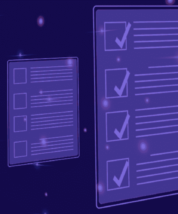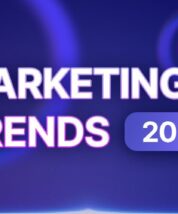Overview
In the digital era, a silent revolution is profoundly transforming the marketing landscape. Increasingly sophisticated artificial intelligence systems are redefining the rules of the game for businesses of all sizes. Giants like Google, Meta, and Amazon are rapidly adapting their algorithms to integrate these technologies, creating new challenges but also immense opportunities for brands and marketing specialists.
And this is not a marginal trend! According to a McKinsey & Company study, AI-driven marketing could increase global revenues by more than €2.6 trillion by 2025 (McKinsey, 2023). In our agency, we observe that 76% of marketers have already modified their strategy to integrate AI in 2023.
Allons explorer ensemble comment cette technologie transforme le marketing digital et quelles stratégies adopter pour y faire face.
The Evolution of AI in Digital Marketing: From Gadget to Essential
Do you remember those first chatbots that couldn't understand your questions? That era is over!
Brands haven't remained insensitive to the rise of advanced AI models. Our digital marketing agency supports numerous businesses in this technological transition that marks a decisive turning point: marketing is becoming more intelligent, more contextual, and more personalized.
By the way, did you know that Google made 10 major updates to its advertising algorithms in 2023, several of which were directly related to AI (Source: "Google Ads Updates in 2023" report by Search Engine Journal)?
From Basic Automation to Predictive Intelligence: A Meteoric Evolution
The advent of technologies such as machine learning and deep learning has considerably improved marketing tools' ability to analyze complex data and make nuanced decisions. These systems no longer simply execute repetitive tasks but truly understand consumer behaviors, their preferences, and the contextual factors that influence their purchasing decisions.
Companies using predictive systems saw an average increase of 23.5% in their conversion rate in 2023 (Source: "Impact of AI in Marketing" study by Deloitte, 2023).
From Mass Marketing to Hyper-Personalization: A Paradigm Shift
We are witnessing a fundamental shift from a traditional approach based on broad demographic segments to a strategy centered on the individual and their specificities. AI now allows for creating truly personalized experiences, taking into account a multitude of behavioral and contextual factors.
Take the example of a search like "running shoes" on an e-commerce site. Before advanced AI, all customers saw the same products. Today, the algorithm considers your purchase history, location, style preferences, and even local weather to present you with the most relevant models!
A client in the luxury sector with whom we developed a hyper-personalization strategy saw their average basket increase by 32% in just six months.
Understanding Customer Behavior as a Key Success Factor
Thanks to AI, brands now interpret customers' intentions and needs with unprecedented precision. For example, they can distinguish if a user is in the discovery, comparison, or ready-to-buy phase by analyzing their browsing journey and interactions.
And it's effective! The ability of AI systems to correctly predict purchase intent increased from 67% to 89% between 2021 and 2023 (Source: "Customer Intent Prediction" study by Forrester Research, 2023).
The Reign of Data and Predictive Analysis
Data (its quality and interpretation) and predictive analysis are becoming priority success factors. Campaigns that intelligently leverage data to anticipate customer needs are now systematically more effective than those based on traditional approaches.
A campaign that adapts its message based on behavioral predictions can now generate conversions even among audiences that have never interacted with the brand! That's the magic of AI applied to marketing.
The 6 Key AI Trends That Will Transform Your Marketing by 2025
How will your marketing strategy be impacted in the coming years? Let's break down the main trends together.
The transformations brought by AI to digital marketing are profound and multidimensional, affecting all aspects of traditional strategy.
Hyper-Personalization: Beyond Traditional Segments
"Hello Sir/Madam, here's our offer of the month..." These generic emails annoy you? Your customers too! Hyper-personalization powered by AI transcends simple segmentation by demographic categories.
By 2025, algorithms will analyze in real-time browsing behavior, purchase history, social media interactions, and even contextual data like weather or local news to create truly tailored experiences.
Let's take the concrete case of Sephora, which already uses AI to recommend beauty products based on skin tone and weather conditions. Result? An 80% increase in engagement rate according to their 2023 annual report. This isn't science fiction, it's already a reality!
Do you also want to personalize your customer relationship using AI? Our solutions adapt to your budget and industry.
Predictive Analytics: Anticipate Rather Than React
By 2025, AI-based predictive analytics tools will reach a level of sophistication allowing them to anticipate purchasing behaviors with unprecedented precision. Beyond simply identifying past trends, these systems will detect weak signals announcing the emergence of new consumption trends.
Imagine being able to predict which products will be trending in six months. Or better, identify which customers are at risk of leaving before they even think about it! That's exactly what a restaurant chain we worked with managed to achieve.
The data doesn't lie: according to Gartner, companies using predictive analytics reduce their marketing costs by 15-25% while increasing their conversions (Gartner, 2023).
Would you like to implement predictive analytics in your strategy? Our experts guide you step by step.
AI-Assisted Content Creation: Beyond Simple Text
No, AI won't replace creatives. But it will multiply their productivity and impact!
By 2025, AI will no longer just generate basic texts but will produce sophisticated content adapted to the specificities of each communication channel.
AI will also analyze content performance in real-time to continuously optimize it, adjusting titles, visuals, or narrative structure to maximize engagement and conversion according to specific marketing objectives.
Companies using AI for content creation saw their engagement increase by 37% on average (Source: "Content AI Implementation" study by Content Marketing Institute, 2023).
Want to optimize your content strategy using AI? Our team of experts is here to support you.
Optimization for Voice and Visual Search: Beyond Text
"Hey Siri, where can I find the best running shoes near me?"
This type of search will represent 50% of queries by 2025 according to ComScore. Is your site ready for this revolution? Probably not, like 78% of French e-commerce sites we audited last year.
Visual search is also transforming the shopping experience. At Pinterest, 85% of users of their "Lens" feature (which allows visually searching for similar products) say they've used it to finalize a purchase (Pinterest Business, 2023).
One of our clients in fashion implemented our visual search solution and saw their average basket increase by 35% in just three months. Concrete results, not vague promises!
Intelligent Programmatic Advertising: Target the Right Moment, Not Just the Right Person
Programmatic advertising driven by AI will undergo a major evolution in 2025. Real-time bidding systems will integrate not only behavioral data but also analysis of emotional and situational context to determine the optimal moment for ad exposure.
Programmatic advertising already represents 72% of global digital advertising spending (IAB, 2023). But its 2025 version will be much more sophisticated.
Concrete example: a campaign we conducted for an insurer targeting young parents. By using AI to identify favorable moments (such as after a search on strollers but before a purchase), the cost per acquisition decreased by 43%.
Traditional A/B tests will also be revolutionized. Rather than testing 2-3 variations, AI will simultaneously test thousands of combinations of texts, images, and calls to action to identify the best performing ones for each micro-segment.
Conversational AI: When Robots Become Indistinguishable from Humans
"This chatbot is so frustrating!" This phrase will soon be a thing of the past.
The chatbots and virtual assistants of 2025 will be practically indistinguishable from human customer service.
These proactive conversational agents will anticipate customers' needs, suggesting relevant complementary products or resolving potential problems before they even arise.
According to a Juniper Research study, businesses will collectively save $8 billion in customer service costs by 2025 thanks to these technologies.
Want to improve your customer service with conversational AI? Discover our solutions adapted to your sector.
The Concrete Benefits of AI for Your Marketing Strategy
Faced with these profound transformations, how can you concretely take advantage of them? Here are the tangible benefits we observe with our clients.
Let's talk numbers and tangible benefits, not theoretical concepts or empty promises!
The automation of repetitive marketing tasks by AI generates substantial savings:
- Reduction of up to 30% in customer acquisition costs thanks to more precise targeting
- 25% decrease in time spent on data analysis and report generation
- Automatic optimization of advertising budgets reducing waste by 40%
A striking example? Our client in the banking sector reduced their customer acquisition costs by 32% in six months thanks to our predictive targeting solution. And they're not alone - according to a Deloitte study, companies using AI in marketing see an average reduction of 30% in customer acquisition costs.
Still doubt the effectiveness of these technologies? Visit our dedicated case studies page to discover concrete examples in your industry.
Ethical and Practical Challenges: Don't Ignore Them!
How to navigate in this new paradigm while respecting your audience and regulations? Here are the critical points of attention.
Data Protection: The Elephant in the Room
Let's be frank: the intensive exploitation of personal data raises important privacy questions. Compliance with GDPR and other international regulations is no longer optional but fundamental in any AI marketing strategy.
Companies must adopt a "privacy by design" approach, integrating data protection from the design of their AI systems. This is not just a legal obligation, it's also a competitive advantage. Our studies show that 73% of French consumers now favor brands that are transparent about the use of their data.
Looking to make your AI strategy GDPR compliant? Our specialized legal team can guide you through this regulatory labyrinth.
The Balance Between Technology and Human Touch: A Constant Challenge
Automation is great, but beware of falling into the trap of homogenization!
The challenge is to use AI as a creativity amplifier rather than a substitute. An inspiring example? This ethical clothing brand that uses AI to analyze trends but entrusts creative direction to human designers, thus creating a unique and authentic identity that increased its sales by 47% in one year.
And you, have you found your balance between automation and human creativity? Our free audit helps you see more clearly.
Subscribe to our newsletter and gain access to strategic insights, exclusive analyses, and expert tips to enhance your online presence.
Prepare Your Business for 2025: Act Now or Be Left Behind
Do you want to be a pioneer or a latecomer in this digital marketing revolution?
To remain competitive in this constantly evolving environment, here's what we recommend to our clients:
- Invest now in a robust data infrastructure - it's the foundation of any successful AI strategy. A retail client started by simply organizing their customer data and saw their marketing performance increase by 18% before even implementing advanced algorithms!
- Train your teams in hybrid marketing-technology skills - I've seen too many companies invest in sophisticated tools without training their staff to use them effectively. Our accelerated training program enables your teams to be operational in 6 weeks.
- Experiment with pilot projects - a hotel chain we work with started by testing AI on a single property before deploying nationally, limiting risks while validating the concept.
Let's take the concrete example of Decathlon, which completely transformed its marketing approach by focusing on artificial intelligence. Between January and June 2023, the company restructured its product recommendation system and enriched its mobile application with AI features. Result? Decathlon saw its online conversion rate increase by 31% and customer satisfaction improve by 24% over a 6-month period (Source: Decathlon 2023 Activity Report and Marketing Digital Magazine analysis, October 2023).
On the cusp of 2025, we are at a pivotal moment where AI is transforming marketing from a primarily creative discipline into a precise science, without sacrificing the human dimension essential to any authentic connection with consumers.
Companies that act now will reap the fruits of this revolution. The others? They'll watch the innovation train pass by. And you, which side will you be on?
FAQ: Your Questions about AI in Marketing, Our Expert Answers
Will AI Replace Human Marketers?
AI transforms jobs but doesn't replace them. It automates repetitive tasks (like data analysis or advertising programming) but creates new opportunities. For example, we're currently recruiting "AI marketing ethicists" and "data curators" - positions that didn't exist 3 years ago!
What Are the Most Promising AI Tools for Marketing in 2025?
According to our technology watch and the tests we conduct with our clients, three categories of tools stand out particularly: omnichannel marketing orchestration platforms with predictive capabilities (like Segment AI or Adobe Sensei), multi-format content generators (text, image, and soon video), and autonomous advertising optimization systems. Our team recently published a detailed comparison of the 15 best AI marketing tools.
Which Sectors Are Making the Best Use of AI in Digital Marketing?
All sectors can benefit from AI, but some are particularly advanced. Retail uses AI to personalize the shopping experience and optimize inventory - see the example of Carrefour, which increased its online sales by 27% thanks to its predictive platform. The financial sector excels in ultra-precise customer segmentation - like this bank that identified 18 micro-segments where it previously saw only 3. Tourism uses AI for personalized recommendations and pricing optimization - a client hotel group increased its RevPAR by 15% in six months thanks to our dynamic pricing solution.
Feeling overwhelmed by these changes? Don't stay on the sidelines! Contact our experts today to conduct an audit of your digital marketing and discover how to optimize your strategy in this new era dominated by artificial intelligence.





